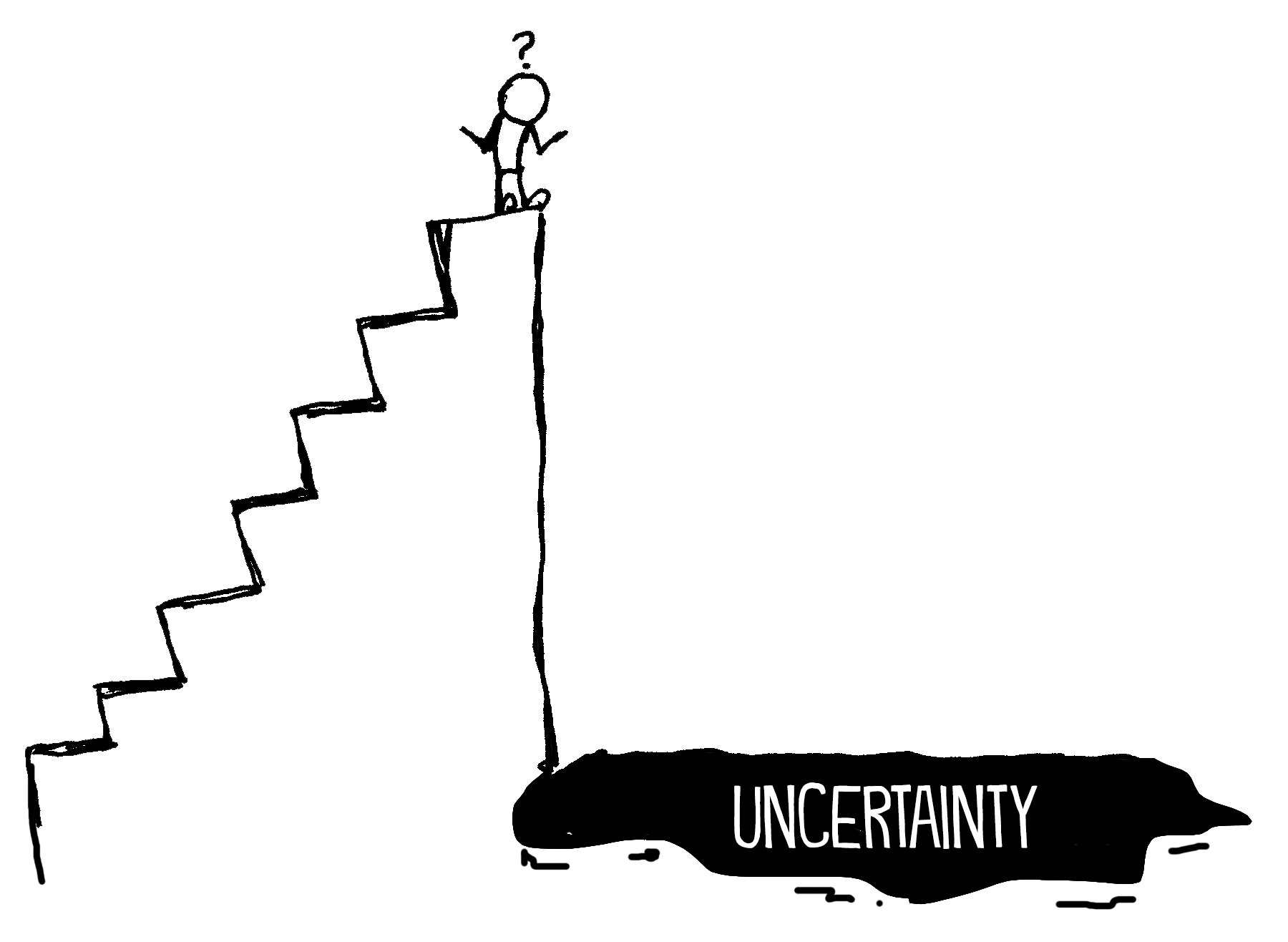The Future
Happiness
Comfortable With Uncertainty
Back to School During COVID
The Future

We talk about this a lot, but most of us talk about it in different ways.
In our usage, we don’t mean the future from science fiction. We’re not talking flying cars and spaceships. We mean the near future, the predictable, the buildable. We mean the future we’re all responsible for, and the one we all have a hand in currently making real. We mean how we’ll have to live.
It’s a loaded concept, certainly. But it’s also the most important we as humans have. Everything we do each day is for the future, whether we realize it or not. Every time we go to work, raise children, eat healthy and exercise, pay bills—it’s all for the future. It’s all so we have something for tomorrow. We want a better world in the evening than we had in the morning. We want a better place next year than we had this year.
Lately, our vision for the future has been much murkier. No one saw COVID coming this time last year. No one prepared for a worldwide pandemic, a crippling economic crisis, and a drastic spike in mental health challenges as a result. It’s increased our anxiety; we no longer know what the future holds, or if it’s even good or desirable. We may now doubt our place in it, and if we can prevent the bad things that seem to spring up without warning. We want some insurance against upheaval.
We won’t ever have it.
That’s a tough lesson, but one that’s true. We won’t ever have the insurance or reassurance we need to know the future is in our hands. We won’t ever have the full control we want. But we can still build for it, and we can still prepare. We can lessen our anxieties by knowing we’ve taken steps to prevent the worst, and we’ve thought outside the box about what might occur so we can stop it.
More important than envisioning what we don’t want, however, is envisioning what we do. The most important thing is that we keep hoping, keep believing, and keep knowing there are better things in the future than there were in the past. The world can continue to improve; we can be better. Our journeys can have the endings we seek, and our dreams can be real if we approach them realistically.
For Alivation, mental health can prove an understandable, treatable thing. We can, someday, cure the things that ail our patients. We can teach them that depression is now temporary, and anxieties can fade. We all build for the future, and we do it together, for the good of all. It’s worth it to dream bigger and aim higher; it’s worth it to try more and let ourselves wish for a future that we build to be better.
Happiness

We don’t talk about happiness as often as we should.
We speak about it as a concept, of course; we discuss it abstractly. We’re aware of moments of happiness, or ideas or things that make us happy. But we don’t often talk about being happy when it’s so easy to not be, or how we can be happy when others are, even if we don’t feel like it. We use phrases like “finding happiness” when maybe it isn’t something found, but rather made. Maybe we should talk about how we make happiness.
August is national Happiness Happens Month. It’s a celebration of being happy, and not letting others rain on your parade for a full month. Of course, it’s much harder (understandably) for many of us to be happy this year, and especially this month. With COVID interfering with back to school plans and causing stress and strain, it’s difficult to work toward happiness. It’s even more difficult to talk about it.
We deserve to be happy. We deserve to work toward things that make us and our families and friends happy. There’s always a way to be happy, and always a way to be better. At Alivation, we live by the motto that we can help anyone be better, and to find their own happiness. We practice what we preach with ourselves, too. We help each other be happy, and to work through even the bad times.
We can’t overstate the values of friendship, camaraderie, love, respect, and effort. We can’t oversell the concept that we can help each other improve, personally and professionally. Alivation is a building full of compassionate, talented professionals. We help each other daily, and we enjoy being able to work with people who can help us in kind. When we need help, we ask for it. When we need to communicate, we do. Simple steps to pave the way for something better.
The same is true in other aspects of our lives. We need people we care about, and we need to be cared about. Working toward happiness entails listening and understanding; it means a conversation. It means putting in effort to improve the things we dislike about ourselves, or listening to constructive criticism about our situation. It means being honest and looking at the world honestly. It means valuing feedback and working toward help. It isn’t found, or simply discovered one day. Happiness can be made by all of us.
For August this year, we’re challenging ourselves to make happiness, and to be better than we were in July. We’re working toward a better world, and building a future. We’re taking stock, enjoying what we have, and helping spread it around. We’re celebrating Happiness Happens Month by making it happen.
Comfortable With Uncertainty

The hardest thing we can do is not know.
2020 has been a year of uncertainty. From COVID to street protests to an election, the world as we knew it has been put on an indefinite hold. We’re not sure if it’ll ever come back the way it was before, or how we’d even know when we reached that target. We don’t know what to expect going forward. We remain locked in uncertainty.
For most of us, this feeling is very uncomfortable. One of the worst sensations we can have is not knowing what we’re doing, where we’re going, or where our journeys will take us. Uncertainty over our finances, school, our health and medical statuses, our political situation, our social relationships, and our economic realities can cause crippling anxiety or depression. It can lead to outright panic.
With the 2020 school year kicking off amidst COVID, everything has become further confused and uncertain. We hear daily updates about football, athletics, education, health, economics, rent, and death tolls. As a frontline essential mental health company, Alivation sees all of this up close daily. We’re used to the hardships, and the rush of different feelings these cause for many. We’re not immune to it, either. We all want the best for the world, and the best outcomes for our friends and neighbors.
The real challenge we all face is becoming comfortable with uncertainty. It’s acknowledging that we don’t have the answers to every question, and that we likely won’t for some time. It means accepting that there are things we can change and things we simply cannot. We’re going to have to go about our daily lives without knowing where we might be at the end of the week, and certainly at the end of the month.
We’ll all have different ways of doing this, and we’ll find varying levels of calm. For many of us, we’ll have frequent anxiety spikes. We’ll have spells of depression, and worry constantly. But we’ll soon accept an old lesson in a new way: We can’t control the world like we’d like. We can’t ensure the outcomes we want, or possibly need. But we can be comfortable with this, and comfortable accepting 2020, and the new decade, with what it brings.
Meditation, communication, education, and reflection can help us bridge the gap between certain and uncertain, fear, anxiety, and hope and comfort. We can bond with our friends and neighbors, and enjoy the little things. We can still watch kids grow up, and be there to help them through this period of hardship. We can talk, text, tweet, and post our hopes. We can get through it all again, and we can learn to live with the uncertainty.
Back to School During COVID

It’s August, and that means school is starting again around the country.For many, this isn’t a normal season, however.
COVID-19 has changed our yearly routine into something much more uncertain. Where once we went school shopping for planners, notebooks, and pencils, this year we’ve also added masks, hand sanitizer, and electronic devices for remote learning to our lists. Many students will be taught at home instead of going into class at all, and many parents will have their already-hectic schedules thrown into further disarray by the pandemic.
Given all these changes, it isn’t hard to see mental health challenges spiking this year. An atmosphere of uncertainty, fear, and misinformation has contributed to the mental health crisis that we now face. Social distancing and pandemic rules have us all wary and exhausted, and the emotional and logistical toll of sending thousands of kids back to school in our communities is only now beginning to be reckoned with.
There are, however, steps we can take to mitigate some of the effects. As with any mental health challenges, seeking help is always the answer if something negatively affects your quality of life. For those facing tremendous anxiety over the prospect of returning to public life during a pandemic, there are counseling and therapy options that can help. Alivation offers telehealth appointments for all needs too, meaning you can seek the help you need without worrying about whether you are putting your family or loved ones at risk.
For those suffering from chronic anxiety and depression, or those who have their conditions exacerbated by current conditions, Alivation also offers a wide variety of options, such as TMS, Ketamine, EEGs, and other services to monitor, diagnose, and treat whatever ails you or keeps you from your best quality of life. It’s essential to take care of yourself during this pandemic, and to safeguard your mental health in quarantine.
There’s been an outpouring of community support and engagement on this issue, ranging from opinions and ideas to solutions and implementations. It’s been encouraging to see our societies taking charge together for the health of the entire school district, and the safety of our vulnerable citizens. The feedback and assistance from others during this time has been extraordinary, and the ability to guide the process is the ability to look after all people potentially affected.
Mental wellness is a journey we all take, and the journey is shared in times of crisis. Though the pandemic is a hard reality, we can make it through with our health, and our sanity, intact. We can keep our kids safe at school while ensuring their education doesn’t fall by the wayside. It’ll be a much different school year than we’re used to, but it doesn’t have to be a bad one.
